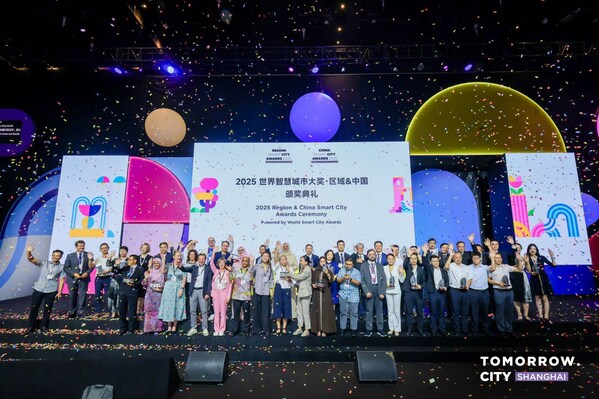Lifestyle
Smart City Awards 2025 Recognize Innovation Across Asia

The 2025 Region & China Smart City Awards celebrated innovation and excellence in urban digitalization during a ceremony held at the Zhangjiang Science Hall in Shanghai on September 4, 2025. Organized by the Smart City Expo World Congress (SCEWC), the awards recognized leading cities, institutions, enterprises, and individuals for their contributions to smart city development across Asia. The event highlighted the growing impact of smart cities on governance transformation and urban sustainability.
This year, the awards featured several categories, including the Leadership Category, City Category, Enterprise Category, Best Products Award, and Best Projects (X-SDI) Award. A total of 152 proposals were submitted, with 47 Chinese cities presenting their applications. The significant participation underscores the awards’ influence in promoting urban digitalization throughout the region.
Wu Zhiqiang, a prominent academician and member of multiple engineering academies, emphasized the importance of global cooperation in urban development. He stated, “Tomorrow.City is not merely a platform to showcase technologies, but also a testbed for jointly exploring the future.” He highlighted that China’s practices in smart city initiatives, green energy, and governance are now being shared globally, creating a model of significance.
Recognizing Leadership and Innovation in Smart City Development
During the ceremony, Guangzhou received the prestigious City Award for its leadership in digital governance and green low-carbon transformation. This accolade positions Guangzhou as a model for modernizing megacity governance worldwide. Shanghai earned the Safety and Resilience Award for its advancements in emergency management, while Suzhou Industrial Park gained recognition for its industrial digitalization efforts. Other notable winners included Dongguan, honored for excellence in smart transportation, and Chaoyang District in Beijing, which received the Innovation Award for exploring new technologies and service models.
These achievements reflect the innovative strength of the Chinese model in promoting sustainable urban development. Shan Zhiguang, Director of the Industrial Development and Research Department at the National Information Center, remarked, “A smart city is not something that is just ‘built’—it is continuously ‘used, improved, and refined.'”
The event also recognized enterprises shaping the smart city ecosystem. Awards were given to leading firms such as Beijing Chaoyang Environment Group Co., Ltd., which won the Leading Corp. award, and smaller enterprises like Shanghai Sancity Environment Technology Co., Ltd., which was recognized as an Outstanding S.M.E. The Rising Start-up award went to Hangzhou CarbonSilicon AI Technology Development Co., Ltd., reflecting the dynamic potential of emerging companies in the sector.
Global Collaboration for a Sustainable Future
The awards also spotlighted the importance of practical scenarios and strong leadership in smart city development. The Best Projects (X-SDI) Award recognized eight innovative projects from various countries, including Kazakhstan, Malaysia, New Zealand, Oman, the UAE, and Thailand. These initiatives ranged from green neighborhoods and smart healthcare to heritage preservation, demonstrating how diverse approaches can address local challenges and enhance urban transformation.
Leadership was a key focus, with the Principal Architect and Core Execution Team of Thailand’s Smart City Capacity-Building Programs receiving the Leader Award. Other notable leaders included HRH Shaikh Essa Abdulla Essa Abdulaziz Al Mualla from the UAE, who received the Youth Talent Award, and Ms. Grace de Leon, Innovation and Improvement Manager of Christchurch City Council in New Zealand, honored with the Expert Award.
As a pivotal stage in the global smart city ecosystem, the Region & China Smart City Awards foster cross-regional learning and collaboration. All participants in the 2025 awards are eligible to apply for the World Smart City Awards, providing opportunities to showcase their innovations internationally.
Wu Zhiqiang reinforced the concept of cooperative development, stating, “Through cooperation and exchange, we are not only designing the cities of the future—we are realizing them.” He called for joint efforts by governments, enterprises, and academia to transform technological innovation into practical urban solutions, ultimately enhancing public well-being. As the vision of Tomorrow.City materializes, it drives the shared goal of creating greener, smarter, and more inclusive cities for the future.
-

 Lifestyle3 months ago
Lifestyle3 months agoHumanism Camp Engages 250 Youths in Summer Fest 2025
-

 Sports3 months ago
Sports3 months agoDe Minaur Triumphs at Washington Open After Thrilling Comeback
-

 Business4 months ago
Business4 months agoKenvue Dismisses CEO Thibaut Mongon as Strategic Review Advances
-

 Sports4 months ago
Sports4 months agoTupou and Daugunu Join First Nations Squad for Lions Clash
-

 Top Stories4 months ago
Top Stories4 months agoColombian Senator Miguel Uribe Shows Signs of Recovery After Attack
-

 World4 months ago
World4 months agoASEAN Gears Up for Historic Joint Meeting of Foreign and Economic Ministers
-

 Business4 months ago
Business4 months agoOil Prices Surge Following New EU Sanctions on Russia
-

 Health3 months ago
Health3 months agoNew Study Challenges Assumptions About Aging and Inflammation
-

 Entertainment3 months ago
Entertainment3 months agoDetaşe-Sabah Violin Ensemble Captivates at Gabala Music Festival
-

 Entertainment3 months ago
Entertainment3 months agoBaku Metro Extends Hours for Justin Timberlake Concert
-

 Business4 months ago
Business4 months agoU.S. House Approves Stablecoin Bill, Sends to Trump for Signature
-

 Top Stories4 months ago
Top Stories4 months agoRethinking Singapore’s F&B Regulations Amid Business Closures









